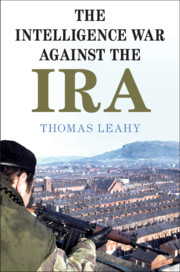Book contents
- The Intelligence War against the IRA
- The Intelligence War against the IRA
- Copyright page
- Dedication
- Contents
- Acknowledgements
- Abbreviations
- Introduction
- Part I The Intelligence War: August 1969 to July 1972
- 1 British Political, Military and Intelligence Strategy towards the IRA: August 1969 to July 1972
- 2 The Intelligence War: August 1969 to July 1972
- 3 The IRA’s Ceasefire: 26 June to 9 July 1972
- Part II On the Verge of Defeat? The Intelligence War: July 1972 to December 1975
- Part III The Struggle to Contain the IRA: January 1976 to April 1998
- Book part
- Notes
- Bibliography
- Index
2 - The Intelligence War: August 1969 to July 1972
from Part I - The Intelligence War: August 1969 to July 1972
Published online by Cambridge University Press: 05 March 2020
- The Intelligence War against the IRA
- The Intelligence War against the IRA
- Copyright page
- Dedication
- Contents
- Acknowledgements
- Abbreviations
- Introduction
- Part I The Intelligence War: August 1969 to July 1972
- 1 British Political, Military and Intelligence Strategy towards the IRA: August 1969 to July 1972
- 2 The Intelligence War: August 1969 to July 1972
- 3 The IRA’s Ceasefire: 26 June to 9 July 1972
- Part II On the Verge of Defeat? The Intelligence War: July 1972 to December 1975
- Part III The Struggle to Contain the IRA: January 1976 to April 1998
- Book part
- Notes
- Bibliography
- Index
Summary
The intelligence war had had minimal impact on the IRA’s campaign by June 1972. Various factors explain the limited infiltration by intelligence services of the city and rural areas where the IRA was operating at that time. In urban areas, IRA support increased following the active role played by republicans in defending nationalist areas, indiscriminate British Army actions against the nationalist community and the lack of political and socio-economic reform by Stormont and Westminster. Other factors unique to rural areas restricted intelligence, included republicans’ long-term sense of injustice at being forced into a unionist-dominated Northern Ireland state in the 1920s. British forces also conducted various indiscriminate security operations in nationalist areas, such as in County Tyrone. These operations provoked further tension. The failure to coordinate British military and RUC Special Branch intelligence on a consistent basis made containing the IRA harder. In addition, IRA barricades in Derry City and Belfast, and the ability of some rural IRA units to use the border to evade detection, meant that surveillance of the IRA via vehicle- or personality-checking systems was difficult. The intelligence war’s failure to significantly erode the IRA’s capacity for conflict partly explains why the British government talked to the IRA in June 1972.
- Type
- Chapter
- Information
- The Intelligence War against the IRA , pp. 29 - 48Publisher: Cambridge University PressPrint publication year: 2020

